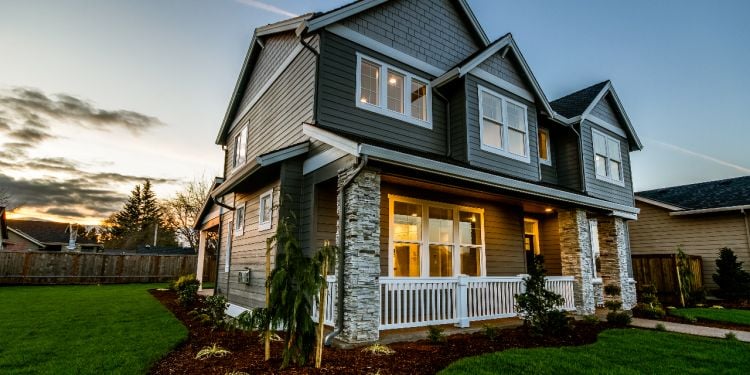Accommodation in the USA

As you're probably aware, the United States is a vast and diverse country with as many different ways of living as you can imagine. If you're planning to move to the USA, once you've got your visa and your tickets, one of the first things you'll need to consider is location and accommodation. From bustling metropolises to charming suburban neighborhoods, the USA offers various housing options to suit various preferences and budgets. Whether you're looking for a vibrant city apartment, a flatshare, a cozy suburban home for your family, or a rural retreat, with a bit of research and hard work, you should be able to find a suitable home base for your expat journey in the USA.
Types of accommodation in the US
In America, the words that are used to describe different dwelling types might be a little different than in your own country, so here's a quick explanation of definitions.
Apartments, studios, and condos
Apartment living is common in the USA – especially in more populous areas. An apartment is a self-contained unit within a larger building. Smaller single-room apartments are known as studios or efficiency apartments. Condominiums are similar to apartments but can also be small, stand-alone homes. These dwellings are grouped together in communities that offer shared amenities like pools, outdoor space, or gyms.
Houses
Houses are stand-alone structures located on relatively small plots of land. Sometimes, you might come across smaller homes on shared plots called bungalows or granny flats. For those looking for a single-family dwelling with shared walls, duplexes and townhouses are popular options. Duplexes are single-level units, while townhouses have multiple floors. With a duplex, one advantage is that they do not have upstairs or downstairs neighbors, leading to reduced noise levels.
When searching for accommodation, you'll often find information listed by size in square feet. The number of beds and bathrooms is typically specified in ads, while the presence of a living room and kitchen or kitchenette is implied unless stated otherwise.
Leased accommodations can be furnished, semi-furnished, or unfurnished. Furnished units may include everything from bedroom and dining room furniture to essential fixtures like linens, towels, cookware, and cutlery, providing immediate living convenience. However, it's essential to review your rental agreement to know exactly what is included and to take inventory if applicable. In the US, most unfurnished rentals come with heating and major kitchen appliances such as a refrigerator and stove/oven combo, with occasional additions like a microwave, washer and dryer, and air conditioning.
Choosing a place to live in the US
Rental price
Naturally, price is often the most significant factor when choosing a place to live. Generally, housing costs and competition increase in larger and denser cities. In America, flat-sharing, renting a room in an already established flat, or sharing a home is a common and acceptable way to save on costs. Other important factors influencing your choice include neighborhood safety and proximity to workplaces or convenient transportation options.
As of 2023, the average rent for an apartment in the US is $1,702. However, the USA is a huge country, and the cost of rent varies depending on several factors, including location, size, and quality. Rent across the US can be compared state-by-state and city-by-city on websites like RentCafe.com. Within cities and states, there can be a huge amount of variation, so it's important to understand that the “average” does not always give you a very clear picture of what kind of rents you should expect in the town or city to which you are moving. The best way to understand prices is to look at current property listings in your chosen destination.
In saying that, here are the average rents in ten American states to give you an idea of the range of prices in the USA.
- Hawaii: $2,532
- California: $2,541
- Massachusetts: $2,737
- New York: $2,660
- District of Columbia (DC): $2,392
- Connecticut: $1,901
- Alaska: $1,397
- Colorado: $1,900
- New Jersey: $2,228
- Oklahoma: $979
Determining your housing budget
It's recommended to allocate around 30% of your salary to accommodation expenses, although, in specific markets, this figure may go up to 50%. Property owners often use these figures to assess your financial ability to afford the rental property and determine your suitability as a tenant.
Searching for a rental property
Once you've assessed your needs and budget, you have various ways to search for rental properties. Online platforms like Craigslist are popular for housing listings, while you can also explore neighborhoods of interest where landlords may display "For rent" signs. Alternatively, using a rental agency can simplify the search process, although bear in mind that fees may be associated with their services.
Visit as many houses or apartments as possible and try to envision yourself living in the neighborhood. Assess the availability of services, facilities, and nearby shops. When using a rental agency, they can arrange viewings based on your preferences.
Applying for a property, signing a lease, and paying a deposit
All rental housing requires an application and lease agreement. Leases typically span from six months to two years, with monthly rent payments. While there's no standardized list of documents landlords require, they usually request a credit history, proof of employment, rental history, and sometimes references. Some landlords may charge an application fee for criminal history and credit checks. Before signing the lease agreement, ensure that it clearly states what the rent includes and take inventory if the property is fully furnished with daily amenities.
When your rental application is approved, you must pay a deposit, usually including the first and last months' rent and a security deposit (usually equivalent to one month's rent). The security deposit protects the landlord in case of any property damage and is typically refunded after the move-out inspection. Upon moving in, both you and the property owner or manager will review the unit's condition and sign a document confirming its current state.
Renter's rights and equal housing laws
In the US, all renters are protected by equal housing laws. The US Department of Housing and Urban Development provides information on renter's rights specific to individual states. It's crucial to be aware of your rights and responsibilities as a tenant.
Buying property in the United States
Benefits of buying a home in the USA
If you are in a happy financial position to buy a home in the USA, it can offer several advantages for expats. Purchasing property provides tax benefits, as homeowners can take advantage of various tax deductions and credits related to mortgage interest and property taxes. Additionally, owning real estate can be a lucrative investment, with the potential for property values to appreciate over time. Being a homeowner can positively impact your credit rating, as it demonstrates financial responsibility and stability to creditors.
However, whether expats can buy a home in the USA depends on their residency status and income. Residency status is a critical factor, as some visa types may limit or prohibit foreign nationals from owning property in the country. Additionally, expats must consider their income and financial capability, as lenders will rigorously evaluate their ability to afford mortgage payments.
Visa requirements and foreign investment
One advantage for expats interested in buying a home in the USA is that there is no specific visa requirement for property ownership, something that many other countries control carefully. The United States welcomes foreign investment, including real estate investment. However, expats must ensure that their funds are from legitimate sources.
In some cases, foreign investors may qualify for an EB-5 investor visa. This visa is designed for individuals who invest a significant amount of capital in a new commercial enterprise that creates jobs for US workers. It is essential to understand that buying property under this visa program does not automatically guarantee a visa or permission to work in the United States. Property ownership and visa considerations are separate matters, and this visa is likely to suit only a very few specific cases.
Applying for a mortgage
If an expat needs a loan from a US bank to purchase a property, there are specific requirements to meet. Proof of residency and employment status is crucial for mortgage applications. Lenders typically require documentation demonstrating stable residency and a reliable source of income.
Additionally, having a Social Security Number (SSN) or Tax Identification Number (TIN) is essential when applying for a mortgage. The SSN is a common US identification number used for tax purposes, while the ITIN (Individual Tax Identification Number) is an alternative for expats who don't have an SSN. Expats who are permanent or temporary residents should request an SSN or ITIN as soon as they are granted a visa to facilitate all of their financial transactions, including mortgage applications.
Finding a home in the USA
Expats have various options when searching for a home in the USA. They can purchase homes directly from the owner or enlist the help of real estate agents, also known as realtors, who can assist with the home search process.
Finding a home in the USA is much like searching for an apartment and can be done through multiple channels. Online listings provide a wealth of information about available properties, and newspapers often feature real estate ads. Driving through desired neighborhoods allows expats to get a sense of the areas they may want to live in – and you might just spot some “For sale” signs while you're at it. Alternatively, contacting a real estate agent can really help organize the search, and a good real estate agent can be very helpful in navigating what may seem like quite an unfamiliar buying process.
Useful links:
The US Department of Housing and Urban Development
Buyers' guide to property in the USA
United States Citizenship and Immigration Services - Information on EB-5 Visas









